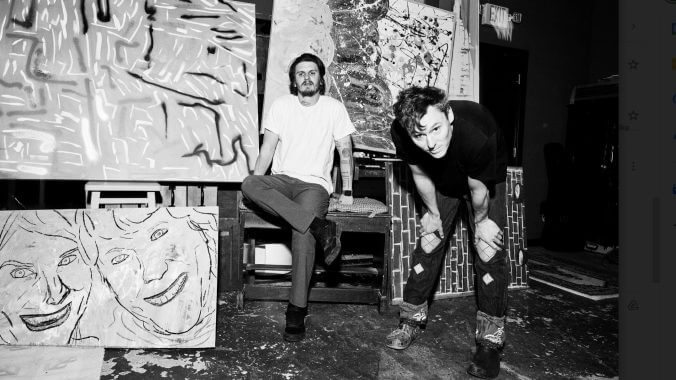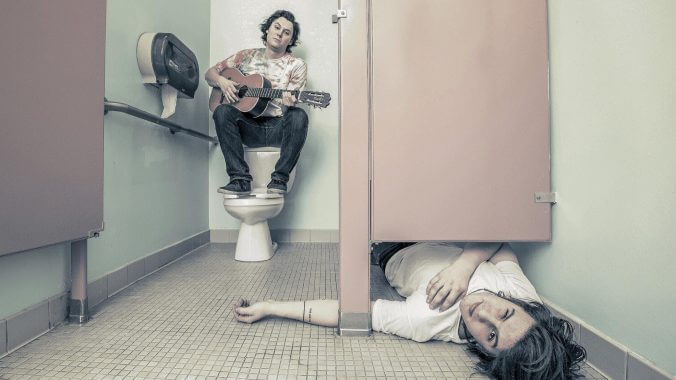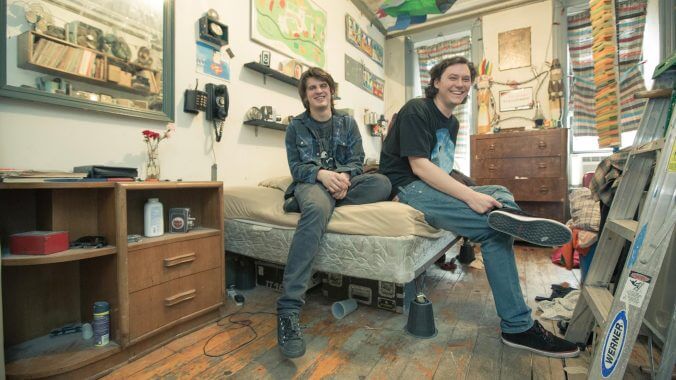Emotional Baby Boys and Very Strong Bones: 10 Years of the Front Bottoms’ Talon of the Hawk
Photos by Jimmy Fontaine & Mark Jaworski
When I was not yet 18 years old but disastrously and acutely aware of my own pronounced and misshapen uncoolness, I stood in the back of a pit at a Front Bottoms concert in Cleveland, Ohio. It was Devil’s Night in 2015 and I fell madly in love with someone hovering around the front row of the Agora Theatre. At that age, nobody said the L-word in a way that wasn’t knowingly—and perhaps tragically—fleeting. With a T-shirt that I bought from the merch table tied around my waist, I watched Brian Sella sing “You were my girl homemade mashed potatoes, biscuits and gravy / You were too good, I should have known / You were a prize my hands could never hold” while a spotlight hit the crowd ever so perfectly in that moment.
And there it was, the hand of someone I had loved dearly, piercing through the bodies and up towards the heavens—like some talismanic, biblical statue in the brief drench of brightness that washed over everyone. I’d come to the show with her but, through the moshing waves of a chaotic organism, we ended up separated for the entire show. A year before that night, we had dated—but only briefly. It was one of those relationships born out of the adrenaline and romance of a small town homecoming dance, and the time we spent talking about how much we liked each other beforehand lasted much longer than the time we actually went out. My use of the word “love” towards her was admittedly rooted in not truly understanding what it really meant to care for another individual without idealizing them.
She and I rarely talk these days, though sometimes we will both hit a checkpoint of quick reconnection on Instagram, as a couple of Zoomers tend to do. And often, that is always enough. I don’t share that same distanced interest with any of my other exes, and I’ve long been removed from the love I tumbled into in that mosh pit eight years ago. I was still growing, still learning how to remove the cloak of enduring immaturity. I still had a way-too-early curfew, guilted my of-age friends into buying me cigarellos I’d only half-smoke and woefully wound up ghosting all of the people I flirted with at some point or another. To that end, I don’t think I was equipped to hold a high school romance close forever. My perceptions of heartbreak and joy were manufactured through chronically online engagement rates and overshares; the wounds of my Tumblr era had not yet scabbed over.
If you were like me in 2013 and you learned how to code your own Tumblr layout through copy-and-pasting someone else’s, perhaps you are also familiar with the website’s emo ecosystem. You are likely also familiar with the Front Bottoms’ album Talon of the Hawk, which came out that same year and, through rigorously reblogging lyrics pasted atop royalty-free photographs, became a phenomenon. I’ve been thinking about the album’s 10th anniversary since last fall—how it doesn’t just return to a monumental chapter in the discography of one of most-enduring folk-punk acts of the last decade, but how it’s an olive branch extended to us 20-something-year-olds who can now leave the enclosure of adulthood and have a good, familiar and worn-in crisis about getting older.
Talon of the Hawk was a huge success, at least in the indie sphere. It didn’t top the Billboard 200 or win a Grammy, but it did inspire hundreds of dudes—most of whom couldn’t really sing all that well—to buy cheap acoustic guitars and start their own bands, which is, like, nearly the same accolade. For the Front Bottoms, they always had an inkling that their sophomore album was destined to blow up. “I knew it was gonna be a smash banger,” Sella tells me over the phone from his place in New Jersey. “Everything was happening [at the] right place, right time. Everything was perfect, in terms of making a piece of art that represented what was going on at the time. We had been making a lot of music before then—making it, recording it and putting it out—but [Talon of the Hawk] was a different way of doing it, [we] made it a special event.”
The Front Bottoms—formed by Sella and Mat Uychich in Woodcliff Lake, N.J., in 2006—first caught a gust of attention with their self-titled debut in 2011. Songs like “Flashlight,” “Maps” and “The Beers” became immediate setlist centerpieces and endure as such in 2023. Perhaps the most-poignant example of who the band was in that era arrives on the song “Father,” when Sella opens the song sharply: “I have this dream that I am hitting my dad with a baseball bat / He is screaming and crying for help / And maybe halfway through, it has more to do with / Me killing him than it ever did protecting myself,” he sings over some off-paced horns, acoustic strums and Uychich’s crunchy percussion. That is the ethos of a Front Bottoms cut; Sella’s songwriting is often as absurd as it is wholesome; one violent image cascades into a breath of familiar heartache.
Inspired by Sella’s infatuation with pocket knives and the character Hawk from Twin Peaks, the band recorded Talon of the Hawk at the Bubble, a studio in Austin, Texas, with Chris “Frenchie” Smith and Sean Rolie. They camped out at the engineer’s parents’ house, sleeping on the floor there for the month they spent recording the album. “I was doing the vocals upstairs and Mat was doing the drums downstairs,” Sella says. “At the end of the day, we would come together and listen to what we had done. Everything was a good step in the right direction, and everything just felt good.”
There was no doubt as to whether or not Talon of the Hawk would register with the Front Bottoms’ fanbase. The album naturally progressed from their choppy acoustic presentation to an instrumentally dense, rich movement. It didn’t hurt that Sella and Uychich had been road-testing some of the songs many months before they were even laid them to tape. “The good vibe was there, and that’s what we had been operating off of until that point. And we continued very naturally with that energy,” Sella adds. “We had been shopping these songs—playing them for an audience—seeing where people would cheer, seeing where people would clap. I knew that was a certain guarantee that the people that liked our band were going to like the songs, because I had played [the album] for them.”

The Front Bottoms were often put in company with other similar acts of the time, like AJJ and Modern Baseball, and engagement from fans online had put them into the stratosphere. Tumblr was a hub; Facebook was a good place to find like-minded groups who dug the same shit; Twitter was still finding its bearings. But Sella and Uychich never paid much attention to the buzz through their phones, nor were they all that hip to cultivating interpersonal connections with fans on the internet. “I wasn’t really on Tumblr, I was a little older. We toured a lot, so that was how I gauged things. It was more of a live audience thing,” Sella adds. “We never really were up on the social media game. We would tweet stupid things, but I caught on very early that there is so much power in the mystery of it.”
-

-

-

-

-

-

-

-

-

-

-

-

-

-

-

-

-

-

-

-

-

-

-

-

-

-

-

-

-

-

-

-

-

-

-

-

-

-

-

-









































